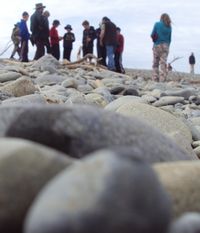Social literacy
Contents
Social Literacy
Community based projects
- Shaping the lives of their participants
Active Citizenship and the Development of Social Literacy through Experiential Learning
Based on the work of Jon Davison and James Arthur
Exploring: The relationship between social literacy, citizenship education and community involvement How experiential learning develops active citizenship
Introduction
- An active citizen is someone who believes in the concept of a democratic society and is willing and able to translate that belief into action
- Social literacy develops social skills, knowledge and positive human values that engender the desire and ability in human beings to act positively and responsibly in range of complex social settings
- Schools as learning communities aim to develop individuals;
- Who feel they have an active and full part to play in society
- Who feel they can cope with relationships with other people
- Who are sociable
- Who are going to be good citizens in the future
- Active citizenship implies and even requires action on the part of the citizen student
- The ability to think and act on social and political concerns underpins effective citizenship education
- Students develop active, collaborative and co-operative working patterns
- Focused on real problems in a real community
Service Learning - Community-Based Learning - Community Participation Community Education - Experiential Learning
Obstacles to experiential learning are:
- Superiority of subject-based knowledge
- Under-valuing of practical knowledge
- Priority given to written knowledge as opposed to other forms of presenting knowledge
- Superiority of knowledge acquired by individuals over that developed by groups of students working together
Stepping Stones
- Students understand the community project they are involved in and know its purpose
- Students know why they are involved
- Students have a meaningful role within the project
- Students have made a free choice to be so involved
- An action competent student is able and ready to participate and can argue, reflect critically and relate their opinions and actions to a values framework - (this needs further explanation)
Braids
- Community of the school
- Community in the school
- School in the community
- Learning for service
- Learning about service
- Learning from service
Citizenship Competency Ladder
- Work in a variety of group settings
- Identify and evaluate the values and ethics of self and others in the community
- Recognise, appreciate and support vital elements of the local community
- Gather and evaluate data necessary to effect positive change
- Implement effective decision making and problem solving strategies
Preparation
- Community service projects may originate in a number of ways
- Students conducting research on their community may identify community needs
- The community may recommend a project
Action
- Action as part of community service needs to be a learning experience
- Experience will not only take the form of direct involvement
- Experience may also result from reading, writing or discussion with peers, teachers, community members or others
- Experience will not only take the form of direct involvement
Reflection
- For community service experience to be worthwhile, students need to see the connection between service and learning
- The experience needs to be ‘made visible’ to them
Celebration
- Finally, it is important that there is recognition not only of service, but also of the learning that has taken place
Conclusion
- Experiential learning in the community provides pupils with opportunities to participate with others in serving the public
- It presents schools with a way of enhancing their pupils learning by developing an effective range of social skills
- The progress of students in citizenship needs to be recorded through a variety of means and they will need to learn how to gather their own evidence of progress
- Experiential learning in the community develops altruism, philanthropy, self-reliance, personal and social virtues
The social dimension of the curriculum must be about acting and doing in real contexts, learning from service, learning about service
Deeper
A good community participation programme will address the issue of academic relevance by connecting knowledge, skills, and concepts with accomplishing a meaningful purpose in the school and/or community.
As such, experiential learning becomes an integral part of school improvement and contributes to this by ensuring that knowledge is gained by the pupil through guided interaction with the community and local environment.
It should develop critical thinking skills that help pupils make evaluations and judgements since community issues and problems cannot always be neatly defined and solved so pupils will also develop problem-solving skills.
This should in turn assist pupils to think across the boundaries of traditional curriculum subjects which should help them become more adept at integrating and applying what they are learning. Experiential learning, well planned and executed, allows pupils from a variety of backgrounds and abilities to work together on real problems that provide unity and purpose beyond the classroom.
This facilitates inclusion, promotes equity and fosters appreciation of cultural diversity by assisting students to relate to others from a wide range of backgrounds and life situations. It will help students to value and understand the differences among individuals and communities. The school community itself will change by creating new relationships with the local community that will be viewed increasingly as a positive learning environment that benefits the school.
...as all students and staff become participants in the process of experiential learning, they develop a personal and collective stake in making something positive happen beyond their own school...
| Work in progress, expect frequent changes. Help and feedback is welcome. See discussion page. |
